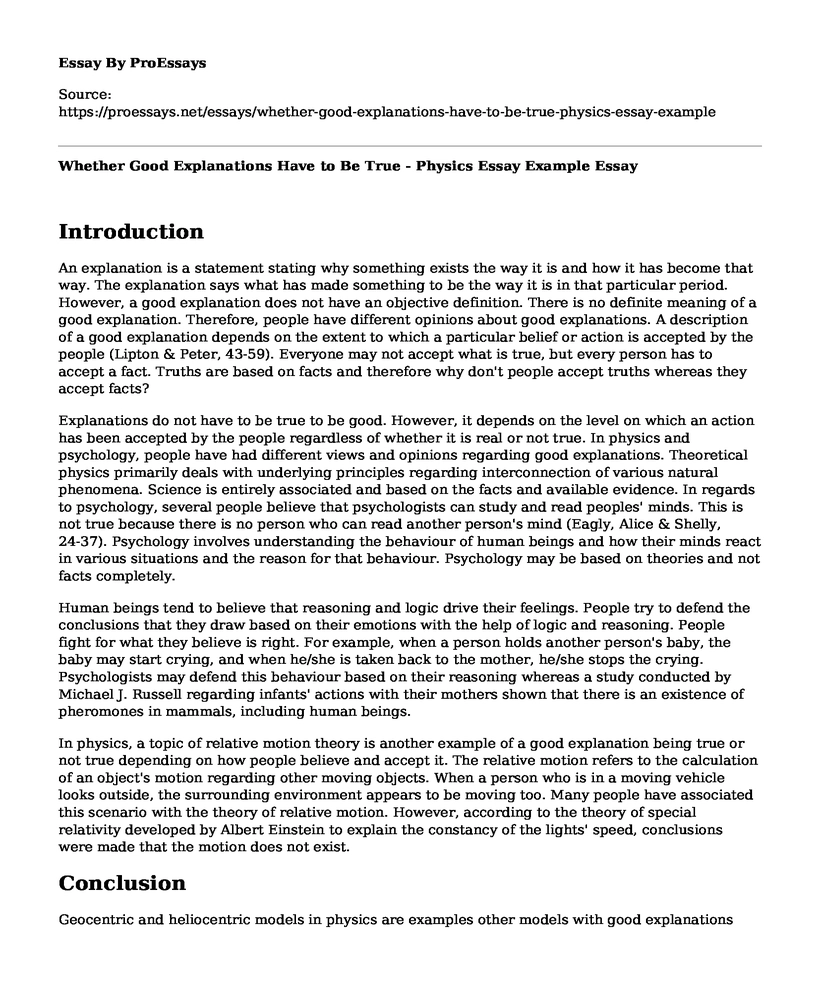Introduction
An explanation is a statement stating why something exists the way it is and how it has become that way. The explanation says what has made something to be the way it is in that particular period. However, a good explanation does not have an objective definition. There is no definite meaning of a good explanation. Therefore, people have different opinions about good explanations. A description of a good explanation depends on the extent to which a particular belief or action is accepted by the people (Lipton & Peter, 43-59). Everyone may not accept what is true, but every person has to accept a fact. Truths are based on facts and therefore why don't people accept truths whereas they accept facts?
Explanations do not have to be true to be good. However, it depends on the level on which an action has been accepted by the people regardless of whether it is real or not true. In physics and psychology, people have had different views and opinions regarding good explanations. Theoretical physics primarily deals with underlying principles regarding interconnection of various natural phenomena. Science is entirely associated and based on the facts and available evidence. In regards to psychology, several people believe that psychologists can study and read peoples' minds. This is not true because there is no person who can read another person's mind (Eagly, Alice & Shelly, 24-37). Psychology involves understanding the behaviour of human beings and how their minds react in various situations and the reason for that behaviour. Psychology may be based on theories and not facts completely.
Human beings tend to believe that reasoning and logic drive their feelings. People try to defend the conclusions that they draw based on their emotions with the help of logic and reasoning. People fight for what they believe is right. For example, when a person holds another person's baby, the baby may start crying, and when he/she is taken back to the mother, he/she stops the crying. Psychologists may defend this behaviour based on their reasoning whereas a study conducted by Michael J. Russell regarding infants' actions with their mothers shown that there is an existence of pheromones in mammals, including human beings.
In physics, a topic of relative motion theory is another example of a good explanation being true or not true depending on how people believe and accept it. The relative motion refers to the calculation of an object's motion regarding other moving objects. When a person who is in a moving vehicle looks outside, the surrounding environment appears to be moving too. Many people have associated this scenario with the theory of relative motion. However, according to the theory of special relativity developed by Albert Einstein to explain the constancy of the lights' speed, conclusions were made that the motion does not exist.
Conclusion
Geocentric and heliocentric models in physics are examples other models with good explanations being true or not true. The geocentric model describes the earth as being the centre of the universe (Sriram, Ramasubramanian & Srinivas, 67). People believed in this model because they believed to the religion which states that God created and placed the earth at the centre of everything in the universe. However, there an alternative model which was proposed by Nicolai Copernicus called heliocentric model which described the sun being as the solar system's centre and all planets revolve around it. These models contradict each other, but people accept the model which they believe has a good explanation and therefore, it is evident that good explanations do not have to be true, but it depends on whether people accept it or not regardless of it being true or not true.
Works Cited
Lipton, Peter. "What good is an explanation?." Explanation. Springer, Dordrecht, 2001. 43-59.
Eagly, Alice H., and Shelly Chaiken. The psychology of attitudes. Harcourt Brace Jovanovich College Publishers, 1993.
Sriram, M. S., K. Ramasubramanian, and M. D. Srinivas. "500 years of Tantrasangraha-A Landmark in the History of Astronomy." RESONANCE 1 (2003): 67.
Cite this page
Whether Good Explanations Have to Be True - Physics Essay Example. (2022, Nov 06). Retrieved from https://proessays.net/essays/whether-good-explanations-have-to-be-true-physics-essay-example
If you are the original author of this essay and no longer wish to have it published on the ProEssays website, please click below to request its removal:
- Drugs Dosage
- Physics Lab Report Example on Density, Mass, and Volume
- Paper Example on Mathematics Teaching
- Was Moon Landing a Hoax or Did It Actually Occur? - Paper Example
- Napkin Ring Problem Analysis
- Essay Example on the Psychic Staring Effect: Fact or Fiction?
- Paper Example on Germany vs. Poland Comparison







